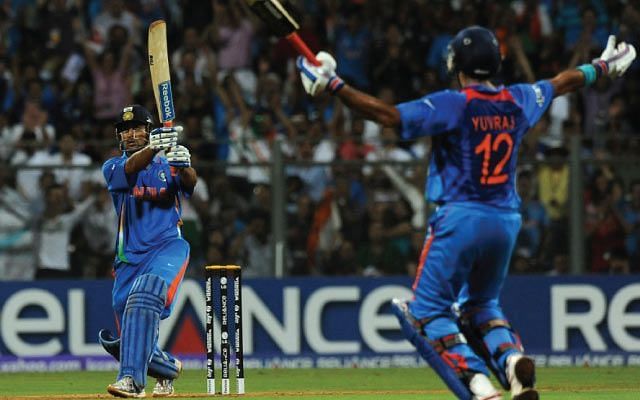
ICC Cricket World Cup: Ranking all the finals in tournament history
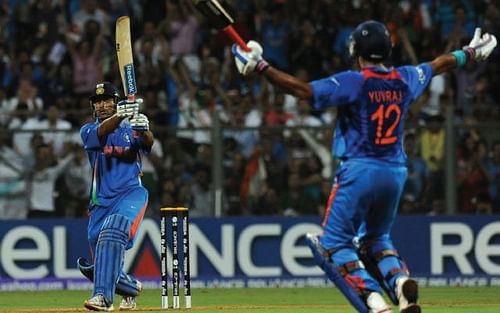
Since its inception in 1975, the ICC Cricket World Cup has gone through 12 editions in over 10 countries. The competition has produced six different winners, with the mighty Kangaroos leading the pack with five trophies in their bag.
Starting with the 60-over-game between West Indies and Australia back in 1975 at Lord's in front of over 20,000 people, the ICC Cricket World Cup Final came full cycle in 2019. With Lord's being the host of the final yet again for the fifth time in history and the first time in the 21st century, England pulled off a remarkable win after a Super Over.
The finals of the ICC Cricket World Cup have been seen different degrees of competitiveness. There have been some lopsided games, some highly intense games, great individual displays, and not to forget, some agonising defeats.
Here, we revisit all the ICC World Cup Finals - from worst to best.
#12 Australia vs Sri Lanka, Kensington Oval, 2007
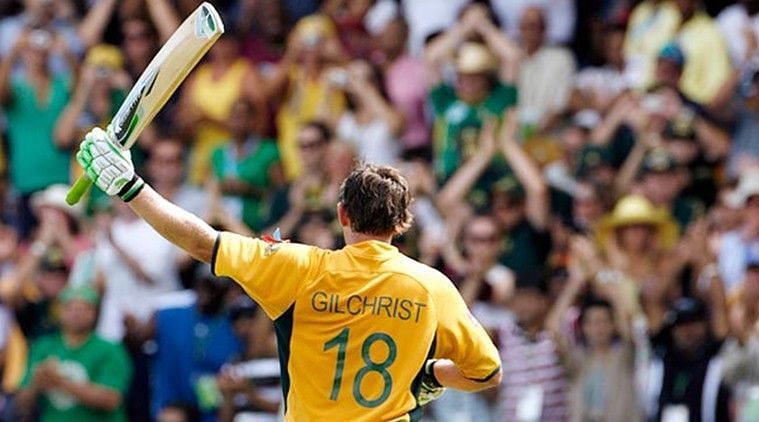
The 2007 Cricket World Cup Final was one of many to suffer a rain delay, and the game between Sri Lanka and Australia was truncated to a 38 overs per side contest. Having elected to bat before the rains, Ricky Ponting did not have to be disappointed with his decision.
Adam Gilchrist put his foot down firmly, scoring 149 off 104 balls, the highest individual score in a World Cup Final. He was supported well by Matthew Hayden, Ricky Ponting, and Andrew Symonds along the way. Australia finished at a staggering 281/4 in 38 overs.
Starting the chase at over seven runs per over, Sri Lanka lost opener Upul Tharanga early. Sanath Jayasuriya and Kumar Sangakkara built an excellent partnership to reach the score of 123 before 20 overs, managing to keep a run rate of about 6. But once the Australian spinners removed the two set batsmen in the space of two overs, the game was almost out of Sri Lanka's reach.
There was another rain delay, reducing the target to 269 and the overs to 36. After 33 overs, Sri Lanka trailed the adjusted DL target by 37 runs, and the umpires suspended play due to bad light.
They then concluded that the remaining three overs had to be bowled the next day. But both captains agreed that there was no reason to return the next day, and the last three overs, where Sri Lanka needed 61, were completed using only spinners in utter darkness.
In hindsight, it was an unusual decision to continue play in darkness, despite having the option of returning the next day.
This goes down as a very underwhelming final due to the massive rain delays and also the lack of competitiveness.
#11 Australia vs Pakistan, Lord's, 1999
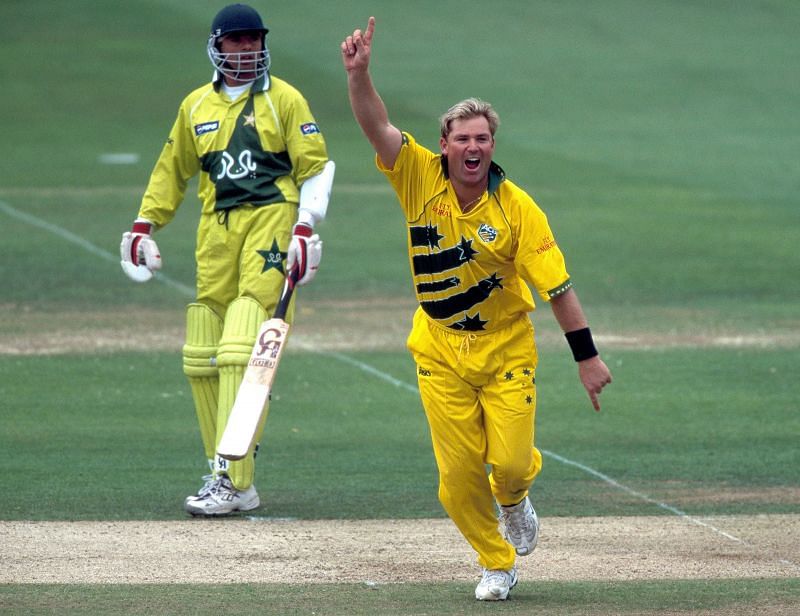
This particular game was also delayed by rain, and thus it was a strange decision on the part of Pakistan to bat first after winning the toss.
The decision didn't work out, and Pakistan barely got any partnerships going. Shane Warne wrecked the middle-order, first getting Moin Khan caught behind and then trapping Shahid Afridi in front of the stumps.
Australia had been staring at defeat against South Africa in the semis, and remained afloat by the skin of their teeth thanks to Shane Warne's magical 4-for. The final was very different though, and a sign of the Australian dominance that was about to follow in the coming years.
Australia chased 133 down with 30 overs remaining in their quota of 50 overs. Man of the Match: Shane Warne, for his 4/33 from 9 overs.
10. Australia vs New Zealand, MCG, 2015
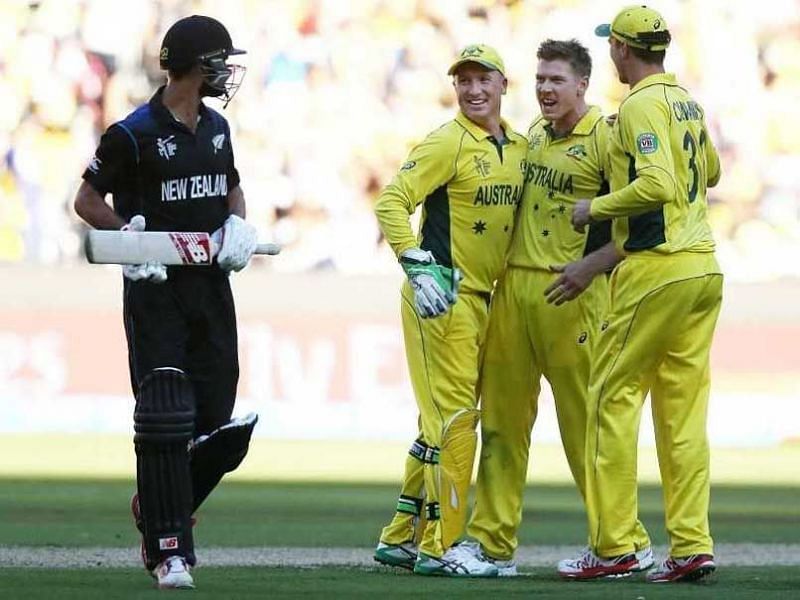
The first trans-Tasman final in World Cup history came about in 2015, when New Zealand made their way to the final unbeaten. The group stage game between the two saw a brilliant low-scoring game that had fiery spells from Mitchell Starc and Trent Boult. Kane Williamson's six at the end narrowly took the Kiwis over the line.
New Zealand were still the underdogs, despite a huge run-chase against South Africa on the back of Grant Elliott's heroics. Choosing to bat on a sunny day, NZ lost their captain and aggressor off the 5th ball of the innings. A deadly inswinging yorker from Starc saw McCullum lose his stumps.
NZ were then reduced to 39/3 as Kane Williamson departed as well. That brought the hero of the semis, Grant Elliott, to the crease again. He added a 111-run partnership with Ross Taylor, setting an excellent platform.
Unfortunately for him, Taylor was caught behind, and Australia ran through NZ's lower middle-order. Elliot finished on 83 (82) but was left without partners, and so he couldn't be aggressive at the death.
Australia's start to the chase was quite similar to New Zealand's innings, with Trent Boult removing Aaron Finch for a duck in his first over itself. The difference, however, was in the way Warner and Smith played.
Warner took the game to NZ and Smith held his ground. Michael Clarke then came into the fray and unfurled his full range of strokes, scoring 74 (72). Australia sailed to the target with ease.
There was once again very little competition in the biggest match of the year, leaving many of the fans disappointed.
9. Australia vs India, The Wanderers, 2003
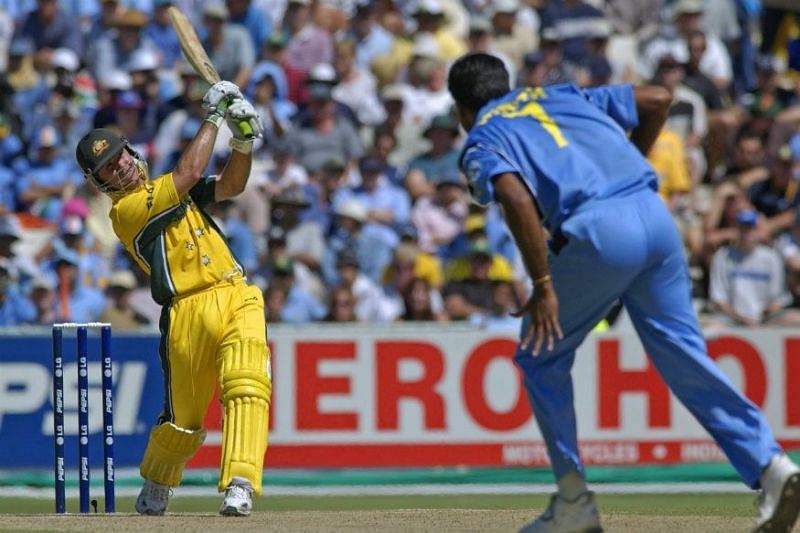
The match at Johannesburg in South Africa was one of the most anticipated finals in World Cup history. The defending champions Australia, the odds-on favourites, were unbeaten throughout the tournament. And India, despite losing in the group stages to Australia, had the tournament's highest and second-highest run-scorers in their ranks - Sachin Tendulkar and Sourav Ganguly.
The Wanderers' surface, considered to be a sound batting track, was affected by thunderstorms on the night before the finals and a short shower on the morning of the game. There was a further forecast of rain on the day. Keeping all this in mind Ganguly elected to bowl first, but the Australians made him pay for that decision.
Zaheer disappeared for 15 runs in the very first over, and the left-handed opening pair of Matthew Hayden and Adam Gilchrist added 105 without loss. The spinner Harbhajan Singh then returned both openers to the pavilion, and the score read 125-2.
Ponting started slow, with his first fifty taking 74 balls, but he ended his innings with eight sixes in a blistering 140*(121) - his second fifty coming off a mere 29 balls. Australia ended at 359/2, the highest ever score in an ICC Cricket World Cup Final.
India lost Tendulkar early, and Ganguly and Kaif followed suit soon. Virender Sehwag offered some hope with his 82, but when he departed with the score at 147, India were four down, still having to chase at a rate of more than seven runs per over.
Australia cleaned up the remaining Indian batsmen to cap off one of the most dominant victories in a World Cup game. It was excellent cricket from the Australians but a one-sided hammering nonetheless.
8. West Indies vs England, Lord's, 1979
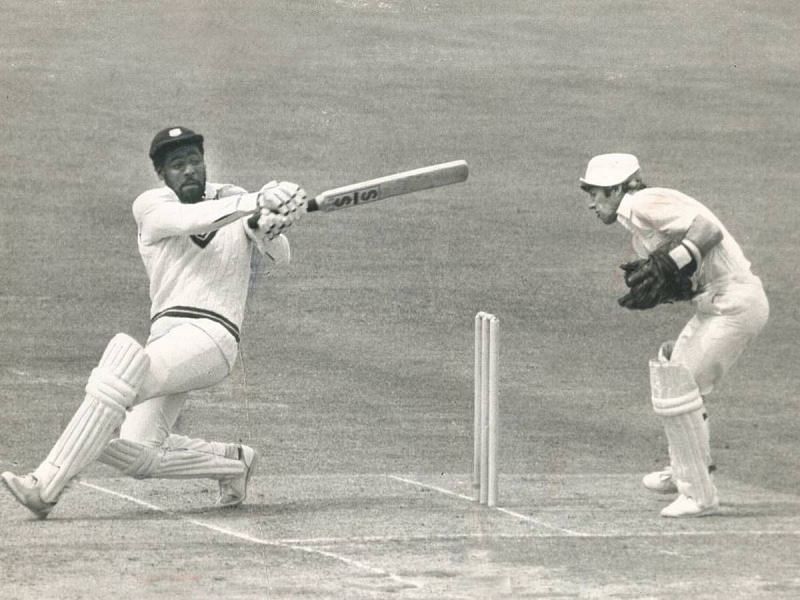
West Indies faced off against England in the second ever World Cup Final. The defending champions were put in to bat first, and at 99-4, West Indies rode on Sir Viv Richards' 138* (157) and a brisk 86 (66) by Collis King to reach 286/9.
England started without losing wickets, but their openers played very slowly despite the big target. Geoff Boycott and Mike Brearley both faced more than 100 balls. 38 overs were complete when the score reached 129, and both openers fell in the space of 6 runs.
The run chase was quite boring, with the openers putting too much pressure on the middle order. Graham Gooch played a handy 32(28) to push the score to 183, but after his departure, England collapsed.
Only 11 more runs were scored, while eight English batsmen returned to the pavilion.
7. Sri Lanka vs Australia, Gaddafi Stadium, Lahore 1996
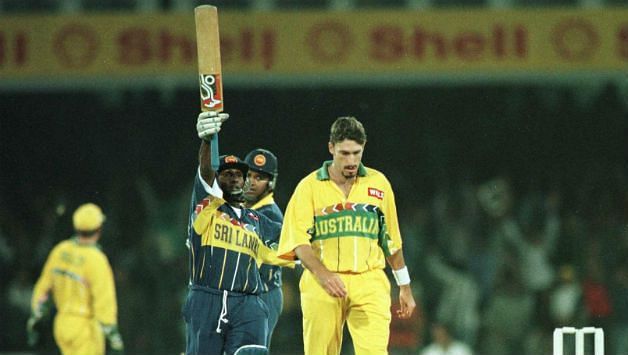
Perhaps the chaotic Indian collapse in the semi-final is more famous than the final itself, but this match had a lot more to it than just two teams facing each other.
When Sri Lanka visited Australia in 1995/96, Muttiah Muralidharan was called for chucking by the umpires in the Boxing Day Test. Later on, after the ODIs, Arjuna Ranatunga declined a handshake from Australian captain Mark Taylor. The animosity grew further as the Aussie crowd chanted "no-ball" at Muralidharan throughout.
Australia had also skipped their group stage game against Sri Lanka at Colombo citing security issues. In the final, however, they had no option but to face each other.
Sri Lanka chose to chase, despite the low percentage of chase victories in World Cup Finals - zero, to be exact - at that time. The decision seemed to have backfired when Australia were cruising with Ponting and Mark Taylor at the crease at 137/1. Enter Aravinda de Silva.
The right-arm offie came around the wicket to Mark Taylor, coaxed him to sweep and got him caught in the process. De Silva then scalped Ponting as well, and Australia could not get more strong partnerships going. They scraped through to 241 thanks to Stuart Law and Michael Bevan.
Sri Lanka started badly with Sanath Jayasuriya throwing his wicket away to a silly run-out and Kaluwitharana mistiming a pull shot. It looked a bit of a tall ask for Sri Lanka at 23-2 but out came Aravinda de Silva again. He scored an unbeaten 107, building partnerships with Asanka Gurusinha and Arjuna Ranatunga.
Sri Lanka reached the finish without any hiccups at all, thanks to a remarkable all-around display by De Silva.
6. India vs Sri Lanka, Wankhede, 2011

The ICC World Cup final in 2011 was intense right from the toss. The match referee couldn't hear the call during the first toss, so it was re-tossed, and Sri Lanka chose to bat against India in ideal batting conditions.
Zaheer's stifling spell set the tone for India. In his first five overs, Zaheer bowled three maidens and took a wicket, giving away a mere six runs.
Mahela Jayawardene held fort at one end, and despite losing partners at the other, he got to a well-made century. Thisara Perera smashed whatever came in his way, leaving Zaheer's final figures in tatters.
India's initial response was weak. Malinga struck on the second ball of the innings, with Virender Sehwag caught plumb in front. He then proceeded to remove Sachin Tendulkar as the Little Master feathered an edge to the keeper.
Virat Kohli held his nerve, and steadied the ship along with Gautam Gambhir to get to 105-2. As Kohli's innings came to a close thanks to a brilliant Dilshan catch, the stage was set for perhaps the best chase in World Cup history, with MS Dhoni promoting himself up the order ahead of the in-form Yuvraj Singh.
A 97 by Gambhir and an unbeaten 91 by MS Dhoni got India past the finishing line, with the Indian captain ending the 28-year-long wait for the World Cup trophy with a massive strike into the crowd. This is one of only four finals to have been won by the chasing side, and is the highest successful run-chase in World Cup Finals.
5. West Indies vs Australia, Lord's, 1975
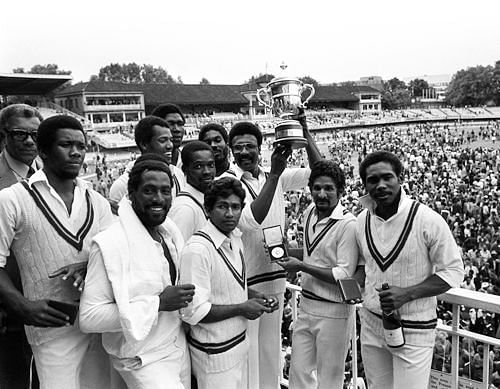
The first edition of the World Cup took place in England, and it was West Indies and Australia who made it to Lord's to determine the winners of the inaugural edition.
Roy Fredericks hit a six off Dennis Lillee's ball, and in the process, lost his balance. In comical fashion, he fell over the wickets, and was given out hit-wicket. The first innings is also well-known for Clive Lloyd's century (102 off 85), which took the Windies to 291.
The highlight of the 2nd innings was the brilliant arm of Sir Viv Richards. Richards ran-out opener Alan Turner, who was looking solid on 40 off 52 balls. He then proceeded to affect the run-outs of both Chappell brothers. Ian Chappell's wicket, in particular, rocked Australia hard in the chase. They were in a comfortable position at 162/3 with 21 overs to go, but Chappell chose to run on a misfield by Richards.
The fact that Australia fell short by only 17 runs was a hard pill to swallow for them, but they are 5-time World Champions, and maybe they don't quite look back on this match much.
4. India vs West Indies, Lord's, 1983
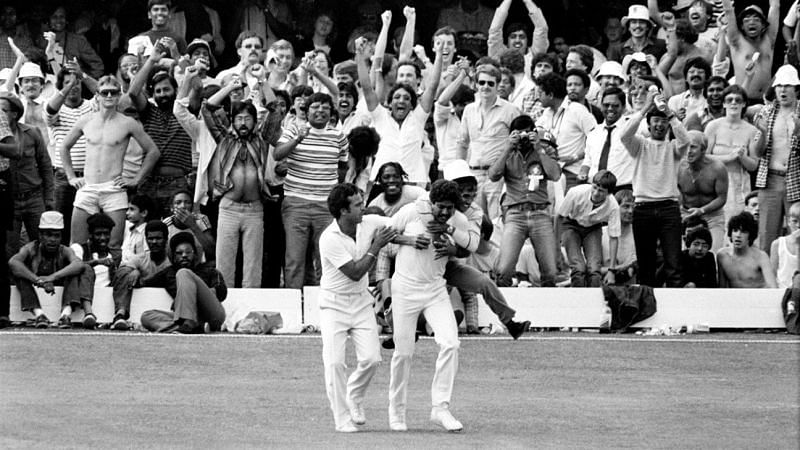
In the 3rd edition of the World Cup, West Indies were playing their 3rd consecutive World Cup Final, having won the previous two. India were playing in their first-ever final and unsurprisingly, went in as the underdogs.
Clive Lloyd won the toss and put India in to bat in the final against the world's best bowling attack. Sunil Gavaskar, known for his long spells at the crease, lasted only 14 balls this time. Kris Srikanth and Mohinder Amarnath weathered the storm against the pace attack, both facing 80 and 108 balls respectively. Kapil Dev's stay did not last long despite three boundaries.
India scrapped their way to 183 with Madan Lal, Syed Kirmani, Balwinder Sandhu, and Sandeep Patil all scoring in double figures.
It still did not look like enough, but the Indian bowling attack would clear every doubt. An inswinger from Balwinder Sandhu took the off stump of Gordon Greenidge very early. The second highlight was Kapil Dev running almost 15 yards back to grab Viv Richards's pull shot off Madan Lal.
Lal then dismissed Larry Gomes, who was caught in the slips. There was then some late magic came from Amarnath, who dismissed both Jeff Dujon and Malcolm Marshall who had dragged Windies to 119 from 76-6.
Jimmy Amarnath's performance was rewarded with a Man of the Match award. This was a proper underdog story as India won their first-ever World Cup.
3. Pakistan vs England, MCG, 1992
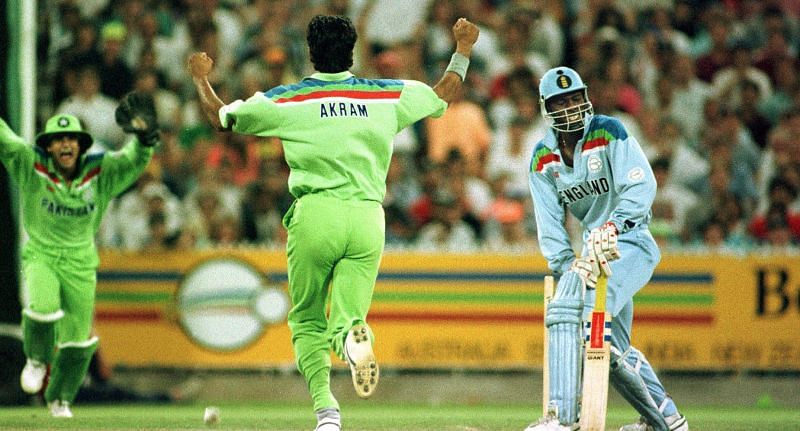
The first edition of the World Cup in Australia had one of the most surprising finalist as well. Pakistan had started the World Cup with a string of defeats, and were immensely lucky with a game being abandoned, but they came alive as a team in the final.
After a rough start, where they lost both openers early, the task was left to Javed Miandad and Imran Khan to steady the ship. They protected their wickets as the score crawled to 34 runs off 17 overs.
Miandad was scalped in the 39th over for a gritty 58, and Khan lost his wickets four overs later, having scored 72. It needed a late onslaught from Wasim Akram, who scored 33 off 18 balls, supported by Inzamam Ul Haq's 42*, to push the score from 197-4 to 249-6.
The Englishmen did not get a good start either, as Ian Botham and Alec Stewart both edged to the keeper. Mushtaq Ahmed's introduction into the attack helped remove Graeme Hick and Graham Gooch, the former caught plumb in front by a wrong-un, and the latter coaxed to sweep by the bowler leading to him being caught in the deep.
England made it to 141 without losing further wickets, with Neil Fairbrother and Allan Lamb at the crease. Imran Khan then rolled the dice again and brought Wasim Akram back into the attack.
The Sultan of Swing bowled a fiery in-swinger on the 5th ball of the 35th over, catching Lamb plumb in front. On the very next ball, Akram bowled another huge in-swinger to Chris Lewis, who played the ball onto his stumps.
The game swung heavily in favour of Pakistan and never really changed course. England did have a late surge in the game, but it was too little too late.
Akram's fiery spell, coupled with his cameo with the bat, got him the Man of the Match award - probably the best all-round display in a World Cup game.
2. Australia vs England, Eden Gardens, 1987
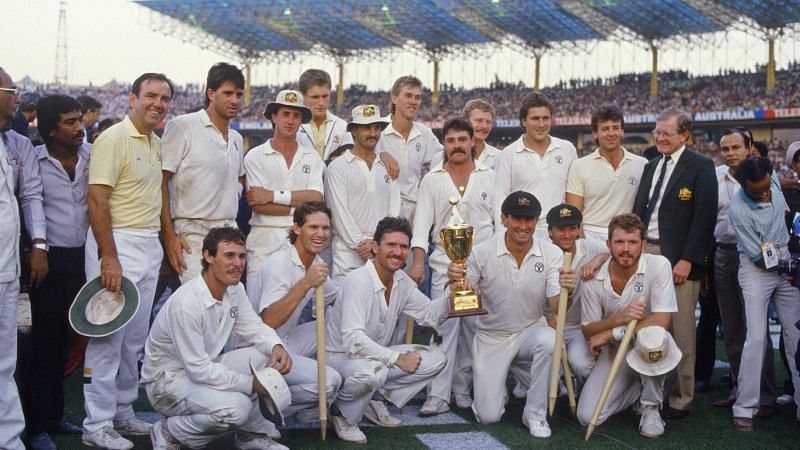
The 1987 edition of the competition was the first to be played out of England, and it was in the subcontinent. Over 90,000 people attended the Final at Eden Gardens in Kolkata. However, the Australian side in this particular tournament were not the favourites to win.
Anchored by 27-year old David Boon in just his third year of international cricket, Australia put up 75 runs for the first wicket and 76 for the second. Craig McDermott and David Boon fell within a space of 2 runs as Australia were reduced to 168-4 at 39 overs.
It was their captain Allan Border and also Mike Velleta, both scoring at a strike rate of over 100, who propelled Australia to 253/5. Veletta was the bigger aggressor, scoring 45*(31).
England opener Tim Robinson fell on his very first ball, leaving England on 1-1. However, a partnership between Graham Gooch and Bill Athey, followed by that between Bill Athey and Mike Gatting, saw them sail smoothly to 135/2.
This was followed by one of the most memorable incidents in World Cup history.
Allan Border, desperate for a wicket, brought himself on to bowl. His first ball to opposing captain Gatting was seemingly drifting down the leg side for a wide. Gatting surprisingly went down on his haunches and decided to play the infamous reverse-sweep, a very peculiar shot back in 1987, and ended up losing his wicket.
The 48th over was an eventful one, with McDermott removing John Emburey via run-out but also conceding two boundaries to Phil DeFreitas. The 49th over was given to Steve Waugh with 19 runs required by England. He conceded only two runs and also sent DeFreitas back to the pavilion.
In the end, 17 off six proved to be too much for England, and they fell short by a mere seven runs. The Kangaroos lifted the trophy for the first time in history, ironically being the crowd-favourites in Kolkata.
1. England vs New Zealand, Lord's, 2019
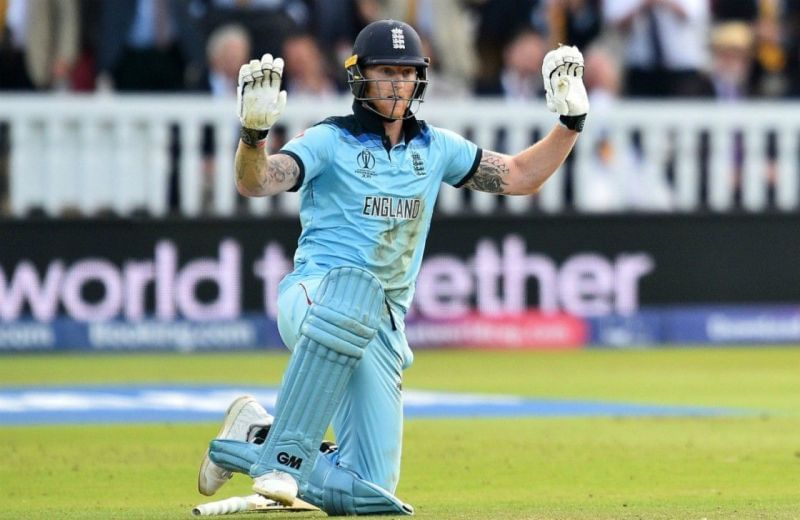
The most recent final of the competition will go down as the most controversial and at the same time the most competitive final in the history of the sport.
Due to a slight rain delay, the toss was pushed behind by 15 minutes, and wet and overcast conditions prevailed throughout the day despite no further rains. New Zealand batted first and were looking good at 103-1 despite the early loss of Martin Guptill.
But Liam Plunkett struck twice on the day, first to remove captain Kane Williamson, and then opener Henry Nicholls. After this, New Zealand kept losing wickets at regular intervals and reached a total of 241/8 thanks to a gritty middle-order knock by Tom Latham.
England were expected to pull off a comfortable chase, but that wasn't what followed. At one stage, the England innings was dangling at 86-4, and it was left to Ben Stokes and Jos Buttler to do the repair work.
At 196-5 after Buttler's dismissal, New Zealand began to chip away at the lower middle-order. They sniffed at the tail, but Stokes was still doing his bit.
The game approached fever pitch after this. A Ben Stokes catch was taken with the fielder, Trent Boult, touching the boundary ropes. The England batsman, who had been at the crease for nearly 30 overs, was showing tangible levels of fatigue as well.
Kane Williamson threw the ball to his best bowler Boult for the final over, with England needing 15 runs to win. Boult started brilliantly with two dots, but Stokes hit the 3rd ball for a 6.
The 4th ball was awarded as six runs after Martin Guptill's throw deflected off Stokes' bat and rolled away to the boundary. The last two balls saw Stokes scampering for the 2nd run to retain strike, resulting in two run-outs at the opposite end.
The scores read 241 for both teams, taking the game to a Super Over.
Stokes and Buttler were back for the Super Over and scored 15 runs. Jimmy Neesham reduced the equation to two runs off one ball for Martin Guptill in Jofra Archer's Super Over.
However, this was Guptill's first ball of the Super Over, and he could only manage to get a single before getting run-out during his desperate attempt for the second run. Again, the scores read 15 for both teams.
England were awarded the win based on the highest boundary rule, which was duly criticized by a considerable amount of people who felt New Zealand were robbed. Umpire Simon Taufel also later pointed out that awarding six runs for the overthrow in the last over was a mistake.
It was a controversial but highly competitive ICC Cricket World Cup Final - and unarguably, the best ever.